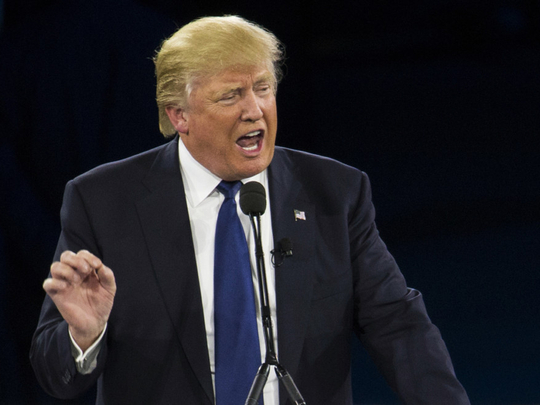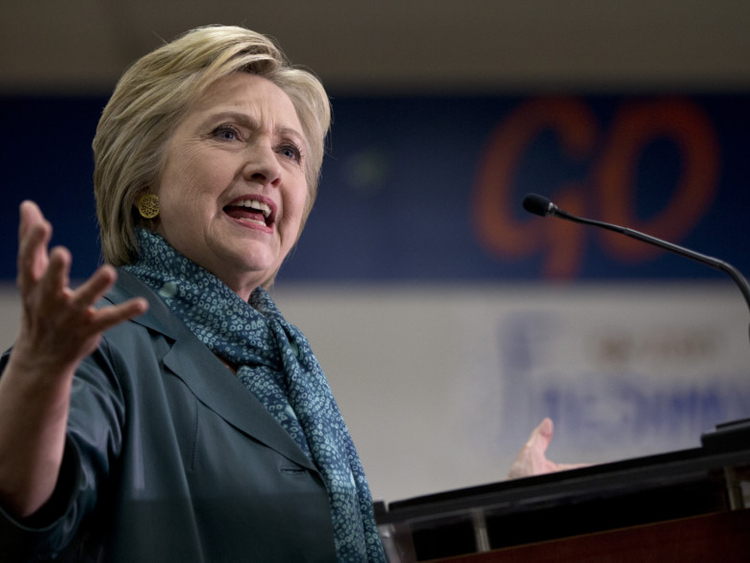
Just hours after Hillary Clinton and Donald Trump launched high-profile attacks against one another on foreign policy, the standoff continued into the night in back-to-back interviews on CNN’s The Final Five candidates’ forum.
The event featured interviews from all the remaining candidates in the 2016 election, but interviews with John Kasich and even Ted Cruz seemed like mere accents — distractions, even — in a larger, highly gendered standoff between Hillary and Trump that could foreshadow a general election in which the politics of sex and sexism is at the fore.
One thing Monday night made clear is if Trump and Hillary do indeed win their parties’ respective nominations, it’s going to be a long, bumpy, gender-politics ridden ride.
After Hillary suggested during a speech to American Israel Public Affairs Committee (Aipac) on Monday that America needs “steady hands, not a president who says he’s neutral on Monday, pro-Israel on Tuesday and who-knows-what on Wednesday”, Trump took her criticism straight to a physical place. “I have the steadiest hands. Look at those hands,” he said, raising a fist up to show the moderator.
It’s a misstep, or at least a macho vulgarity, and Hillary may well have been baiting Trump. And whether the intention was there or not, she succeeded. But when Trump makes such comments about his hands with respect to Hillary and her foreign policy prowess, rather than with respect to another man, it may actually hurt him.
Because what translates as funny, immature jokes between men will read like pure sexism when it’s applied to Hillary. It already reads that way when he’s lambasting Megyn Kelly, but of course she isn’t vying for the top job. Still, public disdain of the way he speaks to Kelly may provide some insight.
Take the “steady hands” moment: Trump took Hillary’s argument about competence and made it about physicality. And shortly after debuting his “steady” fist, he went on to suggest, more or less, that Hillary isn’t man enough to do the job — specifically as it pertains to foreign policy, where women leaders are famously thought to be in danger of being perceived as soft or weak.
He went on to make precisely that insinuation. “Hillary Clinton does not have the stamina, doesn’t have the energy, she doesn’t have it. Doesn’t have the strength to be president,” he told his interviewer. He also said that with her “it’s always drama” — be it Whitewater or her much more recent email controversy.
Such attacks — that it’s “always drama” with her and that she “doesn’t have the strength” for the job — sound like what you might expect to hear a teenage boy say if he were facing off against a teenage girl in the race for seventh grade class president.
It’s a familiar technique for Trump, who, up until this point, has employed schoolyard taunts to tremendous effect. And Trump has seemed to get a lot of mileage for everything from teasing Jeb Bush for turning to his “mummy”, to calling Cruz and dubbing Rubio “little Marco”. But when it comes to sparring with a woman opponent, machismo reads as sexism (rather than homophobia). At least, Hillary will do her best to push that narrative. On Monday night, for instance, a moderator, citing recent public comments about Hillary’s tone of voice and propensity to smile following electoral victories, asked her whether she thought she was held to a double standard.
“I don’t hear anyone say that about men and I’ve seen a lot of male candidates who don’t smile very much and talk very loud,” she offered.
But when asked about how she’d campaign against Trump more directly, she took the high road.
“I intend to run a campaign about the real issues facing our country,” she said, arguing the election is like “a giant job interview”. What it’s about, she insisted, is “who is steady, who is predictable, who gets results”.
And just like that, as surely as Trump took the debate down to the level of physicality earlier in the night, Hillary took it back up to the cerebral. And maybe, that’s precisely what Hillary wanted to happen.
— Guardian News & Media Ltd
Lucia Graves is a Guardian US columnist. She was previously a staff correspondent for National Journal magazine and a staff reporter at Huffington Post.









